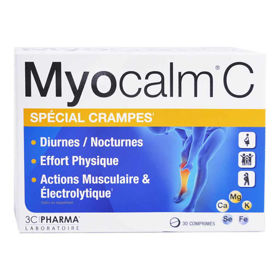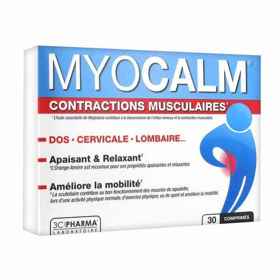Customer question:
What causes muscle spasms, and why do they occur? What to do when they appear?
Anonymous customer.
Answer:
Leg cramps are a common problem that affects the feet, calf, and thigh muscles. They include sudden, painful, and involuntary muscle contractions in the legs and feet. Cramps often occur at night or while resting. Spasms can cause muscle tenderness that occurs up to 24 hours after a seizure episode.
In most cases, there is no identifiable reason why they appear; they are also considered harmless. However, muscle cramps can sometimes indicate a medical condition, such as diabetes or vein disease.
Medication Detralex for the relief of leg cramps
Detralex is a medicine used to treat the symptoms of chronic venous disease. Chronic venous disease is a disease of the veins in the legs, in which the blood drains too slowly from the lower limbs, so the fluid passes through the wall of the capillaries (smallest vessels) and collects in the tissue.
The disease manifests as painful or tired legs, feeling of heavy legs, itching, night cramps, the appearance of varicose veins (varicose veins) on the legs, and swelling of the legs.
What causes leg cramps?
Mainly muscle fatigue and nerve dysfunction can play a role in cramps. Sleeping with your foot outstretched can also trigger nocturnal cramps. Prolonged strain or prolonged muscle use can cause a leg cramp during or after exertion. Cramps often affect athletes, especially at the beginning of the season, especially if their body is not in condition. They can also play an essential role in nerve damage.
Some experts believe that dehydration and an imbalance of electrolytes in the blood can contribute to the appearance of cramps. In addition, athletes who train hard in hot weather often experience muscle cramps. However, scientific evidence has not yet confirmed this link.
Sometimes leg cramps result from a medical condition related to the nervous system, circulation, metabolism, or hormones. Certain medications can also increase the risk.
Older people experience leg cramps more often. Loss of muscle mass begins in the mid-40s of a person's life and increases if a person is inactive. This can also increase the risk of cramping.
Some activities can make you more prone to leg cramps.
These include activities that rely heavily on leg muscles, such as:
- recreational running
- leg exercise with weights
- sports that require a lot of running, such as soccer or basketball
Some experts say that muscle fatigue is the leading cause of leg cramps. The risks are even more significant if these muscles are fatigued in hot weather or when you don't drink enough fluids. You can prevent activity-related leg cramps by drinking plenty of water and avoiding exercise when tired. Pregnancy and certain medical conditions can also increase the risk of leg cramps.
See your doctor if you are pregnant or have any of the conditions mentioned below and often experience leg cramps:
- Addison's disease
- alcoholism
- kidney failure
- thyroid problems
- Parkinson's disease
- type 2 diabetes
- sarcoidosis
- cirrhosis of the liver
- vascular disease
Relief of leg cramps at home
Stretching and massage
Stretch the affected muscle and massage it gently. For a calf cramp, keep your leg straight while pulling the top of the foot on the side that is cramping toward your head. Try standing with your weight on the affected leg and pressing down hard. This also helps alleviate the cramp in the back of the thigh.
Use warm or cold compresses.
Place a warm towel or heating pad on the affected muscle. Massaging a painful muscle with ice can also alleviate the resulting pain. A warm bath also helps with frequent cramps.
Hydration
Another way to stop leg cramps is to drink enough water. Easing the pain may take a little longer, but drinking water or a sports drink with electrolytes can help prevent another cramp.
Exercise
Walking can help relieve leg cramps by signaling the muscle to relax after contracting. However, if all else fails and you continue to have regular muscle cramps, consider getting regular massages to relax the muscles.
Conclusion
Generally, muscle spasms will go away on their own within a few minutes. But if you're dealing with frequent cramps, talk to your doctor them doctors. Currently, there are no medications specifically designed to treat recurrent muscle spasms. However, if your cramps are a symptom of another condition, treating the underlying problem may provide relief.
Interesting reading: Muscle cramps
Interesting reading: Leg swelling










 Facebook
Facebook
 Instagram
Instagram
 info@moja-lekarna.com
info@moja-lekarna.com

